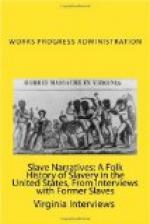The truth had been told at last. The master was both the father of Eliza and the father of Eliza’s son.
“Mistress Hester believed I would be feeble either in mind or body because of my unsatisfactory birth, but I developed as other children did and was well treated by Mistress Hester, Mistress Lorainne and her children.
“Master Patent George died and Mistress Hester married Mr. Lam, while slaves kept working at the rolling mills and amassing greater wealth for the George families.
“Five years before the outbreak of the Civil War Mistress Hester called all the slaves together and gave us our freedom. Courtney, my grandmother, kept house for Mistress Lorainne and wanted to stay on, so I too was kept at the George home. There was a sincere friendship as great as the tie of blood between the white family and the slaves. My mother married a negro ex-slave of Ford George and bore children for him. Her health failed and when Mistress Puss, the only daughter of Mistress Lorainne, learned she was ill she persuaded the Negro man to sell his property and bring Eliza back to live with her.”
[TR: in following section the name George ‘Fordman’ is used twice.]
“Why are you called George Fordman when your name is Ford George?” was the question asked the old man.
“Then the Freedsmen started teaching school in Kentucky the census taker called to enlist me as a pupil. ‘What do you call this child?’ he asked Mistress Lorainne. ’We call him the Little Captain because he carried himself like a soldier,’ said Mistress Lorainne. ’He is the son of my husband and a slave woman but we are rearing him.’ Mistress Lorainne told the stranger that I had been named Ford George in derision and he suggested she list me in the census as George Fordsman, which she did, but she never allowed me to attend the Freedmen’s School, desiring to keep me with her own children and let me be taught at home. My mother’s half brother, Patent George allowed his name to be reversed to George Patent when he enlisted in the Union Service at the outbreak of the Civil War.”
Some customs prevalent in the earlier days were described by George Fordman. “It was customary to conduct a funeral differently than it is conducted now,” he said. “I remember I was only six years old when old Mistress Hester Lam passed on to her eternal rest. She was kept out of her grave several days in order to allow time for the relatives, friends and ex-slaves to be notified of her death.
“The house and yard were full of grieving friends. Finally the lengthy procession started to the graveyard. Within the George’s parlors there had been Bible passages read, prayers offered up and hymns sung, now the casket was placed in a wagon drawn by two horses. The casket was covered with flowers while the family and friends rode in ox carts, horse-drawn wagons, horseback, and with still many on foot they made their way towards the river.




